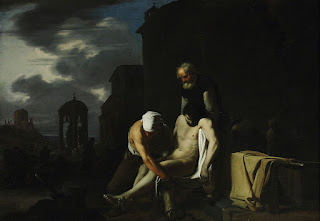 When Rabba bar bar Channa got sick, the Sages came to visit him and, while there, asked a question: "If two messengers brought a Get, do they still need to say that it was written and signed in front of them?" He said, "No, they don't." He then presented a new argument: "If they testified that the husband divorced her, they would be believed, no? So we should believe them that the Get is valid."
When Rabba bar bar Channa got sick, the Sages came to visit him and, while there, asked a question: "If two messengers brought a Get, do they still need to say that it was written and signed in front of them?" He said, "No, they don't." He then presented a new argument: "If they testified that the husband divorced her, they would be believed, no? So we should believe them that the Get is valid."Meanwhile, a Persian follower of the cult of "Chabar" came and extinguished their candles because, at the time of the "Chabar" holidays, the light was allowed only in their temples of idol worship. Rabba bar bar Channa said, "God, either protect us here or exile us to the Roman empire, for at least they come from Esau!" But we learned that Persia was better!? – Yes, it was before the "Chabar" people came.
A divorce document (Get) must have a date in it. Therefore, if they started writing it in the afternoon, but by the time the witnesses got to signing, it was night – it is already another day, the Get is invalid and must be rewritten. On the other hand, if they started at night, they can sign it the next morning because it is still the same calendar day.
And why do they require a date in the Get? – A man is allowed to marry his sister's daughter. In fact, there were times when this was commendable. Since he marries his niece, he may exhibit avuncular behavior. For example, to protect her in case she is unfaithful to him, he may give her a Get without a date. Now if she is ever caught being unfaithful, she can bring the Get to court and claim that she was already divorced at the time of unfaithfulness. Others say that this is rare and that the date on the Get is needed to support monetary claims.
Art: Uncle Fred by James Jacques Joseph Tissot














































